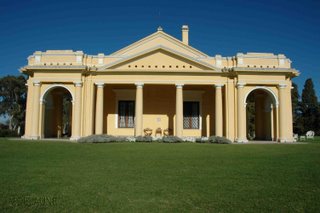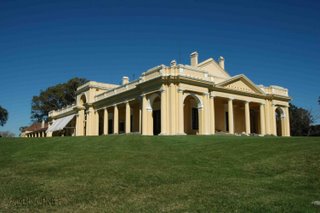 If some dedicated to him a certain admiration (the last owner of Estancia La Paz, the Roca family holiday house, tells that the best society ladies of Buenos Aires, had given an ivory covered book to him, to thank him for having saved colonist women and children from the “malones” of the Indians), others preserve of him the memory of the sanguinary chief of the “Campaign of the desert”.
If some dedicated to him a certain admiration (the last owner of Estancia La Paz, the Roca family holiday house, tells that the best society ladies of Buenos Aires, had given an ivory covered book to him, to thank him for having saved colonist women and children from the “malones” of the Indians), others preserve of him the memory of the sanguinary chief of the “Campaign of the desert”. At that time, the colonial thrust, which find expression in the creation of new villages, exacerbates indeed tensions with the indigenous community, in particular with the people Mapuche (Araucans). President Avellaneda, in power since 1874 entrusts Alsina then Roca with the responsibility to subdue the Indian tribes organized in confederation under the authority of Cacique Namuncurà.
At that time, the colonial thrust, which find expression in the creation of new villages, exacerbates indeed tensions with the indigenous community, in particular with the people Mapuche (Araucans). President Avellaneda, in power since 1874 entrusts Alsina then Roca with the responsibility to subdue the Indian tribes organized in confederation under the authority of Cacique Namuncurà. The zeal with which Roca fulfills his mission (*) allow to obtain very quickly a lasting peace in the most southern areas and to put forward the sovereignty of Argentina in Patagonia.
The zeal with which Roca fulfills his mission (*) allow to obtain very quickly a lasting peace in the most southern areas and to put forward the sovereignty of Argentina in Patagonia. With these successes, Roca reaches the power in 1880. He will stay at the head of the country until 1884. The collective memory remembers his time like that of “generation 80's” marked in the cultural sphere by a certain fascination for France.
With these successes, Roca reaches the power in 1880. He will stay at the head of the country until 1884. The collective memory remembers his time like that of “generation 80's” marked in the cultural sphere by a certain fascination for France. Many haussmannians architects and landscape designers (**) are invited to give to Buenos Aires a resemblance of Paris. In the high society, established already at the edge of Rio, in the northern districts , in San Isidro, it is of good form to speak French. Town centre large colonial houses were deserted by their occupants in 1871, at the time of the yellow fever epidemic, and most of them became the reception buildings (conventillos) for penniless immigrants.
Many haussmannians architects and landscape designers (**) are invited to give to Buenos Aires a resemblance of Paris. In the high society, established already at the edge of Rio, in the northern districts , in San Isidro, it is of good form to speak French. Town centre large colonial houses were deserted by their occupants in 1871, at the time of the yellow fever epidemic, and most of them became the reception buildings (conventillos) for penniless immigrants. Paradoxically, manners remain very strict. On the Mar del Plata beaches, men do not have the right to be less than 30 meters from the women and the sale of telescopes is prohibited.
Paradoxically, manners remain very strict. On the Mar del Plata beaches, men do not have the right to be less than 30 meters from the women and the sale of telescopes is prohibited. Roca will recover the power in 1898. His mandate, which will end in 1904, will be marked by frontier tensions with Chile, to which a certain Francisco Pascasio Moreno (*) will try to find solutions.
Roca will recover the power in 1898. His mandate, which will end in 1904, will be marked by frontier tensions with Chile, to which a certain Francisco Pascasio Moreno (*) will try to find solutions.(*) Article “the glacier Perito Moreno” (février 2006)
(**) Article "Jean-Charles Thays" (août 2006)
Estancia La Paz
www.estancialapaz.com
(00 54) 35 2549-2073
No comments:
Post a Comment